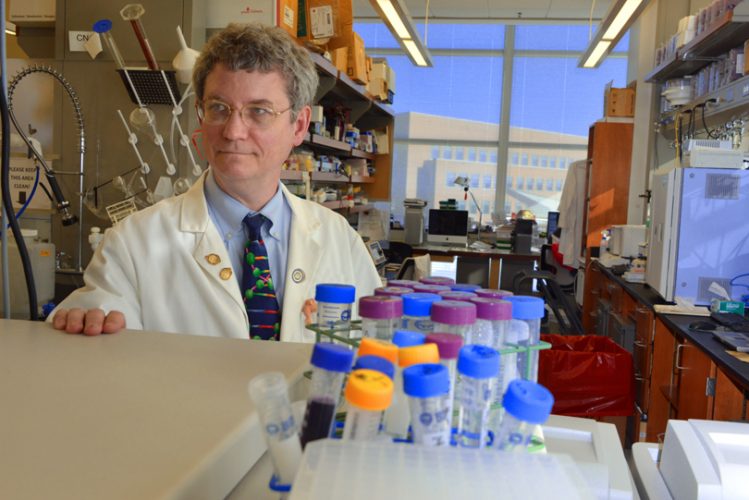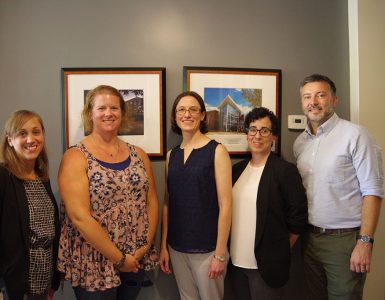Immunotherapy and epigenetics are reshaping the future of health care from inside your body.
The market for curing childhood cancer is tiny. The reasons why are many.
For one thing, childhood cancer is extremely rare. According to the National Cancer Institute, in 2014, there were only 15,780 cancer diagnoses in children aged 0-19 in the United States. Compare that to more than 1,685,000 total diagnoses in 2016. Second, most children survive their cancer diagnoses. According to St. Jude Children’s Research Hospital, 98 percent of children diagnosed with acute lymphoblastic leukemia go into remission within weeks of beginning treatment. Of those, 90 percent go on to be fully cured. Rates vary from cancer to cancer, but even against the most aggressive brain tumors, children typically fare better than adults. Add to that the complications involved with starting clinical trials for children — finding affordable drugs, getting informed consent — and it’s amazing anyone tries.
From a market standpoint, it’s a lot of effort for not much return.
However, for Dr. David Munn, co-founder of the Pediatric Immunotherapy Program at Augusta University, it’s more than worth it. He and his colleagues at the Medical College of Georgia and the Georgia Cancer Center have been trying to close the gap between “cured for a while” and “cured forever” in childhood cancer for the last 20 years.
An alumnus of MCG (MD ’84), Munn returned after graduation largely because of the university’s emphasis on patient-and-family-centered care.
“One of the reasons I came back is that we don’t make a distinction if you’re rich or poor, black or white,” Munn said.
Once back, he began working with Dr. Andrew Mellor, co-leader of the Cancer Immunology, Inflammation and Tolerance Program. Together, they began researching an enzyme with a great deal of immunotherapy potential: Indoleamine 2,3-dioxygenase, better known by its acronym, IDO.
The foundation of immunotherapy is helping the body fight its own battles, but the process isn’t always smooth. Munn jokes with his students that the immune system is the only part of the body that will actively try to kill its host while doing its job. It’s a formidable opponent. Especially when left to its own devices.
“The immune system spends most of its time and effort keeping itself turned off,” Munn said. “Because of this, it needs a sort of yin and yang to function properly, to know when to attack this and when to back off and not attack that.”
In some cases, IDO is the trigger that flips that switch.
IDO expression is at its highest in the womb during pregnancy. Using this knowledge, Munn and Mellor began studying the role IDO plays in pregnant women’s immune responses. Originally researchers assumed the increased expression of IDO was a response from the mother—a sort of biological kill switch designed to keep the immune system from destroying a fetus in the early stages of pregnancy. What Munn and Mellor discovered was just the opposite.
The mother’s body doesn’t express IDO to protect its fetus; the fetus expresses IDO to protect itself from mom’s immune system. It was a remarkable discovery for many reasons, not the least of which being that some cancerous tumors also express IDO in large quantities.
“Essentially, IDO helps tumors hide behind normal tissue,” Munn said. “By expressing IDO, the tumor gives the immune system the order not to attack.”
Munn and Mellor expanded on that concept, obtaining a patent on their findings which paved the way for the development of new drugs for clinical use. Together, they partnered with biopharmaceutical company NewLink Genetics Corporation to speed up the development process. Now, one of the drugs developed, Indoximod, is being used in clinical trials for children with brain tumors — right here at home.
Along with Dr. Ted Johnson, another MCG graduate, Munn founded the Pediatric Immunotherapy Program in the hopes of discovering a more effective, less toxic front-line treatment for children with brain tumors. Drugs like Indoximod, which inhibit the expression of IDO, help kids to better fight their own cancer.
While Munn and Johnson focus on helping bodies fight their own battles, the College of Nursing is hard at work battling chronic disease in a different way.
In February 2017, the college launched its new Family Epigenetics Program (FEP) to conduct family epigenetic research and integrate it into new technologies and frontline health strategies.
Dr. Pam Shiao, associate dean for research, said the driving force behind the FEP was a new emphasis on “Omics” tech and epigenetic research. (“Omics” is a catch-all term for biology fields ending in –omics, such as genomics or metabolomics.) The goal is to help individuals and families determine how best to care for themselves on a case-by-case basis.
But what are epigenetics?
If the human body were a computer, genes would be the software that defines how it runs. Genes govern every aspect of our lives: the color of our eyes, the way our digestive organs process fat, our likelihood of getting cancer. And, as is often the case with software, when newer versions roll out, glitches sometimes get buried inside the original code. Over the course of a lifetime, various genes can “tag” themselves to switch on or off to better adjust to conditions within the body. A child who experiences starvation in utero and early in life may have a greater likelihood of dying from obesity-related cardiac disease, for example, because certain genes which regulate fat storage may have tagged themselves “switched off” during adolescence.
The process of cataloging these on-and-off tags in an individual is referred to as epigenetics.
Research has shown these on-and-off tags can even be passed from parent to child. While this can sometimes be beneficial, it can also be dangerous as chronic conditions like heart disease, diabetes and obesity can also be passed down through family trees.
Finding these tags and using them to treat individual patients according to their own genetics is the future of personalized medicine.
“Personalized health care will benefit those living with multiple chronic health conditions that impact across generations,” Shiao said. “Using epigenetics, which are known to affect cancers, heart disease and congenital defects, the FEP envisions that new, precision-based health strategies will optimize access to healthy living globally.”
Despite the intimate nature of medicine, the discipline is only now becoming personalized. Advancements like those developed by Munn and the College of Nursing are on the leading edge of health care. And they’re only the beginning. Whether it’s giving your immune system the tools it needs to fight cancer, or using the body’s genetic road map to fight chronic illnesses, the future of medicine is, quite literally, within each of us.
Health care — for you, by you.





